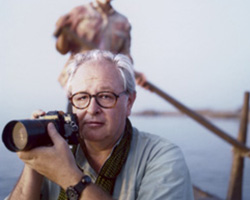
Philip Jones Griffiths
2007 Honoree / Achievement In Photojournalism
Born in Rhuddlan, Wales, Griffiths studied pharmacy in Liverpool and practiced in London while photographing part time for the Manchester Guardian. In 1961 he freelanced for the London Observer. He covered the Algerian War in 1962, then became based in Central Africa, moving from there to Asia. A member of Magnum since 1966, he photographed in Vietnam from 1966 to 1971 and became famous for his book on the war, Vietnam Inc. Out of print in a few weeks, Vietnam Inc. crystallized public opinion and was essential in shaping Western misgivings about the US involvement in Vietnam and ultimately helping to bring the war to an end.
As television took over the task of day-to-day news transmission, Griffiths, one of the very few photographers with his or her own agenda, was able to concentrate on conditions behind the headlines. Vietnam Inc. is also a documentary study of Vietnamese peasant life. Although Griffiths’ sympathies were with the indigenous forces, his position was a criticism of the de-humanizing powers of technology and its bureaucratic apologists. The outcome of three years of reporting, Vietnam Inc. is one of the most detailed surveys of any conflict, and its effectiveness depends also on the author’s personal layout and commentaries, both matter of fact and darkly ironic.
In 1973 he covered the Yom Kippur War and then worked in Cambodia (1973-75). In 1977 he was based in Thailand, covering Asia. In 1980, Griffiths moved to New York to assume the presidency of Magnum, a post that he held for a record five years. His photographs have appeared in every major magazine in the world, and his stories, often self-assigned, led him to over 120 countries in all five continents.
Griffiths, who has exhibited widely in the US and Europe, continues to work on such stories as Buddhism in Cambodia, Drought in India, Poverty in Texas, The Re-greening of Vietnam, and the legacy of the first Gulf War. His film work includes a documentary for the BBC on the descendants of the HMS Bounty living on Pitcairn Island, a film about the effects of strip-mining on a valley in South Wales and a film about the Khao-I-Dang Refugee camp in Thailand for the United Nations High Commission for Refugees. His BBC film, The Ho Chi Minh Trail, was shown on PBS in 1990. His “A Welsh Eye” aired in Britain in 1991 and a film on Cambodia appeared in 1997. His most recent documentary was a personal prediction of the future trends, transmitted on the first day of the new millennium. Through his photographs, texts and films, Griffiths continues to reflect on the unequal relationship between technology and humanity. His lifetime’s work is summed up in his recent book, Dark Odyssey. His reflects that we once lived in harmony with our surroundings, but alienating interests have duped us. Human stupidity always catches Griffiths’ eye, but, faithful to the ethics of the Magnum founders, he still believes in human dignity and in the capacity for improvement.
